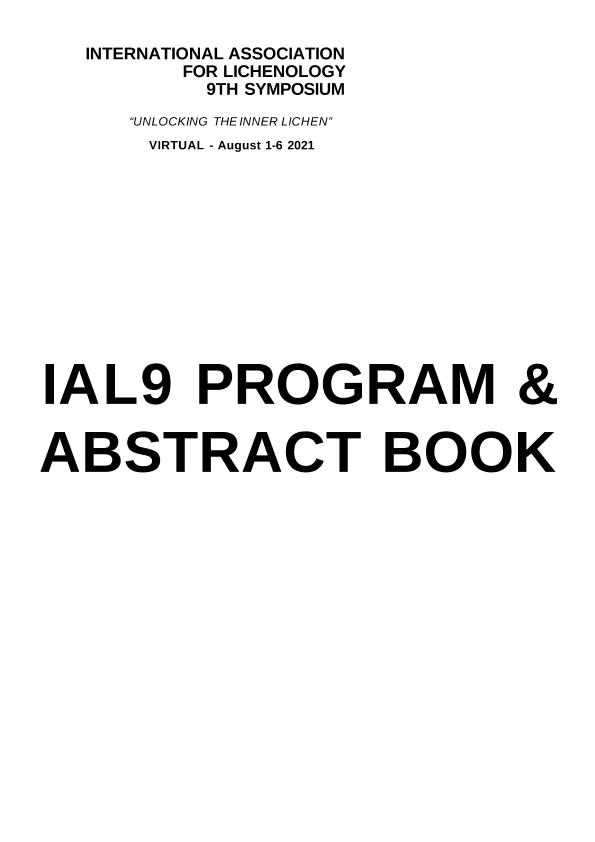Mostrar el registro sencillo del ítem
dc.contributor.author
Rodriguez, Maria Pia

dc.contributor.author
Michlig, Silvia Andrea

dc.contributor.author
Niveiro, Nicolás

dc.contributor.author
Ferraro, Lidia Itati

dc.date.available
2022-04-28T12:05:08Z
dc.date.issued
2021
dc.identifier.citation
Crocodia species in northern argentinean forests: distribution range and potential distribution; International Association for Lichenology 9th Symposium; Brasil; 2021; 188-189
dc.identifier.uri
http://hdl.handle.net/11336/155973
dc.description.abstract
This study aims to present a revision of Crocodia Link (Peltigeraceae, Lobarioideae) in northern Argentinean forests, to estimate its distribution range and potential geographic distribution in the region and to determine main factors affecting its distribution. Crocodia is a cosmopolitan genus with its highest diversity in the southern hemisphere in tropical and temperate regions. It is characterized by a foliose thallus, with green algae photobiont and internal cephalodia with cyanobacteria, yellow medulla, yellow pseudocyphellae on the lower surface, pedicellate and usually pubescent or verrucose apothecia, fusiform-ellipsoid, brown, and usually 3-septate ascospores, colorless bacilliform conidia, and triterpenoids as characteristic chemical components. A total of 114 specimens of CTES herbarium were studied, together with additional type specimens. Morphological and anatomical analyses were carried out using standard stereoscopic and compound light microscopes. Measurements were made with ImageJ software. Lichen substances were identified with spots tests. Based on occurrence data of material studied together with localities available in literature from northern Argentina and adjacent regions of bordering countries potential distribution was modeled with Maxent version 3.3.k. Cllimatic and topographic variables of WorldClim and Envirem were used and jackknife test was used to measure their importance. As a result, three species were identified from northern Argentinean forests: C. arvidssonii, C. aurata, and C. clathrata. Their distribution range is extended: C. arvidssonii is recorded for the first time for Argentina; C. aurata for Corrientes, Misiones, and Salta provinces; and C. clathrata for Corrientes and Jujuy provinces. Species potential distribution models have shown that highest suitable areas are mostly coincident with the Yungas Province (northwestern Argentina), and the Paranaense Province (northeastern region), both dominated by subtropical rainforests. Most relevant environmental variables affecting these species distribution are SAGA-GIS topographic wetness index (C. arvidsonii), elevation (C. aurata), and mean monthly potential evapotranspiration of driest quarter (C. clathrata).
dc.format
application/pdf
dc.language.iso
eng
dc.publisher
International Association for Lichenology
dc.rights
info:eu-repo/semantics/openAccess
dc.rights.uri
https://creativecommons.org/licenses/by-nc-sa/2.5/ar/
dc.subject
Crocodia
dc.subject
Peltigeraceae
dc.subject
Lobarioideae
dc.subject
Argentina
dc.subject.classification
Micología

dc.subject.classification
Ciencias Biológicas

dc.subject.classification
CIENCIAS NATURALES Y EXACTAS

dc.title
Crocodia species in northern argentinean forests: distribution range and potential distribution
dc.type
info:eu-repo/semantics/publishedVersion
dc.type
info:eu-repo/semantics/conferenceObject
dc.type
info:ar-repo/semantics/documento de conferencia
dc.date.updated
2022-04-26T14:01:25Z
dc.journal.pagination
188-189
dc.journal.pais
Brasil

dc.journal.ciudad
Bonito
dc.description.fil
Fil: Rodriguez, Maria Pia. Consejo Nacional de Investigaciones Científicas y Técnicas. Centro Científico Tecnológico Conicet - Nordeste. Instituto de Botánica del Nordeste. Universidad Nacional del Nordeste. Facultad de Ciencias Agrarias. Instituto de Botánica del Nordeste; Argentina
dc.description.fil
Fil: Michlig, Silvia Andrea. Consejo Nacional de Investigaciones Científicas y Técnicas. Centro Científico Tecnológico Conicet - Nordeste. Instituto de Botánica del Nordeste. Universidad Nacional del Nordeste. Facultad de Ciencias Agrarias. Instituto de Botánica del Nordeste; Argentina
dc.description.fil
Fil: Niveiro, Nicolás. Consejo Nacional de Investigaciones Científicas y Técnicas. Centro Científico Tecnológico Conicet - Nordeste. Instituto de Botánica del Nordeste. Universidad Nacional del Nordeste. Facultad de Ciencias Agrarias. Instituto de Botánica del Nordeste; Argentina
dc.description.fil
Fil: Ferraro, Lidia Itati. Consejo Nacional de Investigaciones Científicas y Técnicas. Centro Científico Tecnológico Conicet - Nordeste. Instituto de Botánica del Nordeste. Universidad Nacional del Nordeste. Facultad de Ciencias Agrarias. Instituto de Botánica del Nordeste; Argentina
dc.relation.alternativeid
info:eu-repo/semantics/altIdentifier/url/https://doity.com.br/ial9
dc.relation.alternativeid
info:eu-repo/semantics/altIdentifier/url/https://doity.com.br/ial9/blog/ial-program-book
dc.conicet.rol
Autor

dc.conicet.rol
Autor

dc.conicet.rol
Autor

dc.conicet.rol
Autor

dc.coverage
Internacional
dc.type.subtype
Simposio
dc.description.nombreEvento
International Association for Lichenology 9th Symposium
dc.date.evento
2021-08-01
dc.description.paisEvento
Brasil

dc.type.publicacion
Book
dc.description.institucionOrganizadora
International Association for Lichenology
dc.description.institucionOrganizadora
Universidade Federal de Sergipe
dc.description.institucionOrganizadora
Botanical Research Institute of Texas
dc.description.institucionOrganizadora
Universidade Federal de Mato Grosso do Sul
dc.description.institucionOrganizadora
British Lichen Society
dc.description.institucionOrganizadora
American Bryological and Lichenological Society
dc.source.libro
International Association for Lichenology 9th Symposium: program and abstract book
dc.date.eventoHasta
2021-08-06
dc.type
Simposio
Archivos asociados
